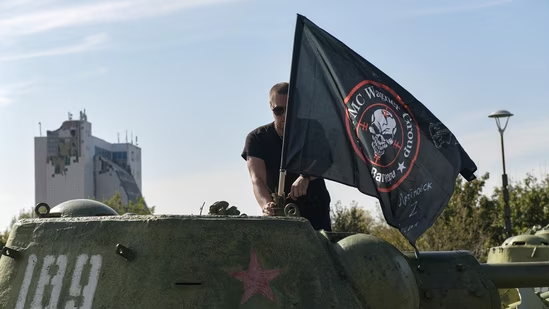How Wagner survived Yevgeny Prigozhin’s death
True friends, says Hassan Bouba, swigging from a mug with Vladimir Putin’s face on it, “are those who are by your side in the most difficult moments. And Russia was with us in the most difficult of moments.” Mr Bouba is the minister of livestock in the Central African Republic (CAR), one of the world’s poorest and most fragile countries. He is referring to the help the Wagner Group, a Russian mercenary outfit, gave his government in dispatching an armed rebellion nearly four years ago. But Mr Bouba could equally have more personal memories in mind. In 2021 the minister was arrested by a UN-backed special court and charged with war crimes he allegedly committed when he was a rebel fighting a previous government. Yet after only a week in prison, he was freed. Many suspected that Mr Bouba, known for his close personal ties to Wagner, had his Russian friends to thank.

In recent years Russia has combined official diplomacy with a mix of gangsterism and colonial enterprise to advance its interests in Africa. Wagner’s operations in CAR served as a blueprint for the second portion of that enterprise, which has been most fruitful in fragile places. The way the group has evolved in recent months illustrates how that approach has changed since the summer of 2023, when Yevgeny Prigozhin, Wagner’s oligarch founder, was killed weeks after he staged an abortive mutiny against Mr Putin. Though the group’s activities have been brought under closer control of the Russian state, it retains its presence on the continent. Yet without big changes to its modus operandi, it is unlikely to expand further.
Wagner first arrived in CAR in 2018. Quietly backed by the Russian state (which publicly denied any involvement with the group), Prigozhin’s mercenaries offered protection to the government of Faustin-Archange Touadéra, CAR’s president. In January 2021 they helped defeat a coalition of rebels contesting Mr Touadéra’s re-election. “They saved our democracy,” claims Fidèle Gouandjika, an adviser to the president. In return, Wagner was given access to the country’s most lucrative gold and diamond mines. Russia replaced France, the former colonial power, as CAR’s most influential foreign ally.
The approach was repeated across the continent. By 2023 Wagner was present in about a dozen other African countries, in particular Mali, Libya and Sudan. Reports of horrific human rights abuses allegedly committed by Wagner fighters across Africa did little to dent the group’s influence.
The events of last summer briefly threw the Wagner model—and, by extension, Russia’s entire Africa strategy—into doubt. After Prigozhin’s rebellion, Mr Putin sought more control over an operation that had previously thrived on plausible deniability. The Russian state moved in, breaking up the mutineer’s portfolio of security, business and media interests. Several hundred Wagner personnel, including some leaders, were withdrawn from CAR. By the end of 2023, Wagner’s Africa branch had been formally replaced by the Africa Corps, a new umbrella organisation for multiple quasi-state expeditionary forces under Russia’s ministry of defence.
Yet the practical consequences of the restructuring have been limited. In some ways, they appear to have elevated the group’s status more than damaged it. That is particularly evident in CAR, where Wagner continues to operate under its own brand name. Western efforts to dislodge the 1,500-2,000 Wagner troops spread around the countryside have gone nowhere. The government rebuffed an offer of alternative security assistance from an American private security firm. Western diplomats complain that Wagner leaders still enjoy unrestricted access to Mr Touadéra, despite a recent rapprochement between CAR and France. In Bangui, the capital, hotels and shopping malls remain full of burly Russian men, their faces covered with balaclavas. A monument dedicated to Wagner troops killed in service in the country has been erected in the city centre.
If anything, Wagner has continued to expand its activities in CAR. Its mercenaries are reportedly developing a base intended to host 10,000 troops by 2030 and serve as a hub for Russian military operations in Africa. In contrast with their previous role as shadowy forces kept at arm’s length by the Russian state, Wagner fighters have also taken on new quasi-diplomatic roles. They are said to have been involved in negotiations to reopen the road to neighbouring Chad, and to have helped set up a joint force to patrol the shared border. “It’s like a second life for this force,” says Jedrzej Czerep of the Polish Institute of International Affairs.
Beyond CAR, the group’s record is patchier. In Mali and Libya, former Wagner men have been reinforced by fighters from other paramilitary units under the Africa Corps, some of whom have recent battle experience in Ukraine. Small contingents of Russian mercenaries, possibly supported by detachments from the official Russian army, have been dispatched to Burkina Faso and Niger, Mali’s neighbours in the chronically unstable Sahel region.
Yet Wagner and its successors have found waging counter-insurgencies in the Sahel much more difficult than in CAR. Last November they achieved an important symbolic victory in helping the Malian army capture the rebel stronghold of Kidal.
More recently they have faced setbacks, including a major defeat near the Algerian border in July in which scores of Wagner fighters died. Efforts to acquire stakes in Mali’s mineral sector, meanwhile, have also made less progress than the group might have liked. According to the Sentry, an independent investigative outfit, none of the country’s industrial or artisanal gold mines are yet in Russian hands.
That may be one reason for the Russian state to try different approaches to pursuing its economic interests. While Prigozhin was able to risk his own fortune in CAR on business ventures ranging from diamond mining to beer brewing, these days Wagner and its successors are more constrained by the Kremlin.
Since the oligarch’s death, Russia has overall become “less transactional and more strategic” in its investments in the region, argues Samuel Ramani, author of “Russia in Africa”. In September Russia’s space agency signed a deal with Mali, Burkina Faso and Niger to deploy telecommunications and remote-sensing satellites over their territories. Last year Russia’s state nuclear company signed a preliminary agreement to construct a power plant in Burkina Faso. It is reportedly also building a large solar plant in Mali and seeking the rights to a giant uranium mine in Niger.
This points to a bigger strategic dilemma. From the early days of Prigozhin’s entry into CAR, the Wagner model offered the Kremlin a cheap, high-impact means to propel Russian influence in Africa. But CAR was, in some ways, exceptional. Mali’s junta has proven more reluctant than Mr Touadéra to allow Russian mercenaries to seize mining assets. Burkina Faso’s junta avoided welcoming Russian troops until Wagner had been replaced by Africa Corps. Other African governments share similar concerns. With Russia’s official army tied up in Ukraine, there are limits to how much the Kremlin can assuage them.
Further expansion in Africa would probably require even more top-down involvement from the Russian state. That, in the long run, might further undermine the very arm’s-length arrangement which seemed to deliver so many benefits to the Kremlin in the first place.
Sign up to the Analysing Africa, a weekly newsletter that keeps you in the loop about the world’s youngest—and least understood—continent.
Disclaimer: The copyright of this article belongs to the original author. Reposting this article is solely for the purpose of information dissemination and does not constitute any investment advice. If there is any infringement, please contact us immediately. We will make corrections or deletions as necessary. Thank you.
Title:How Wagner survived Yevgeny Prigozhin’s death
Url:https://www.investsfocus.com







